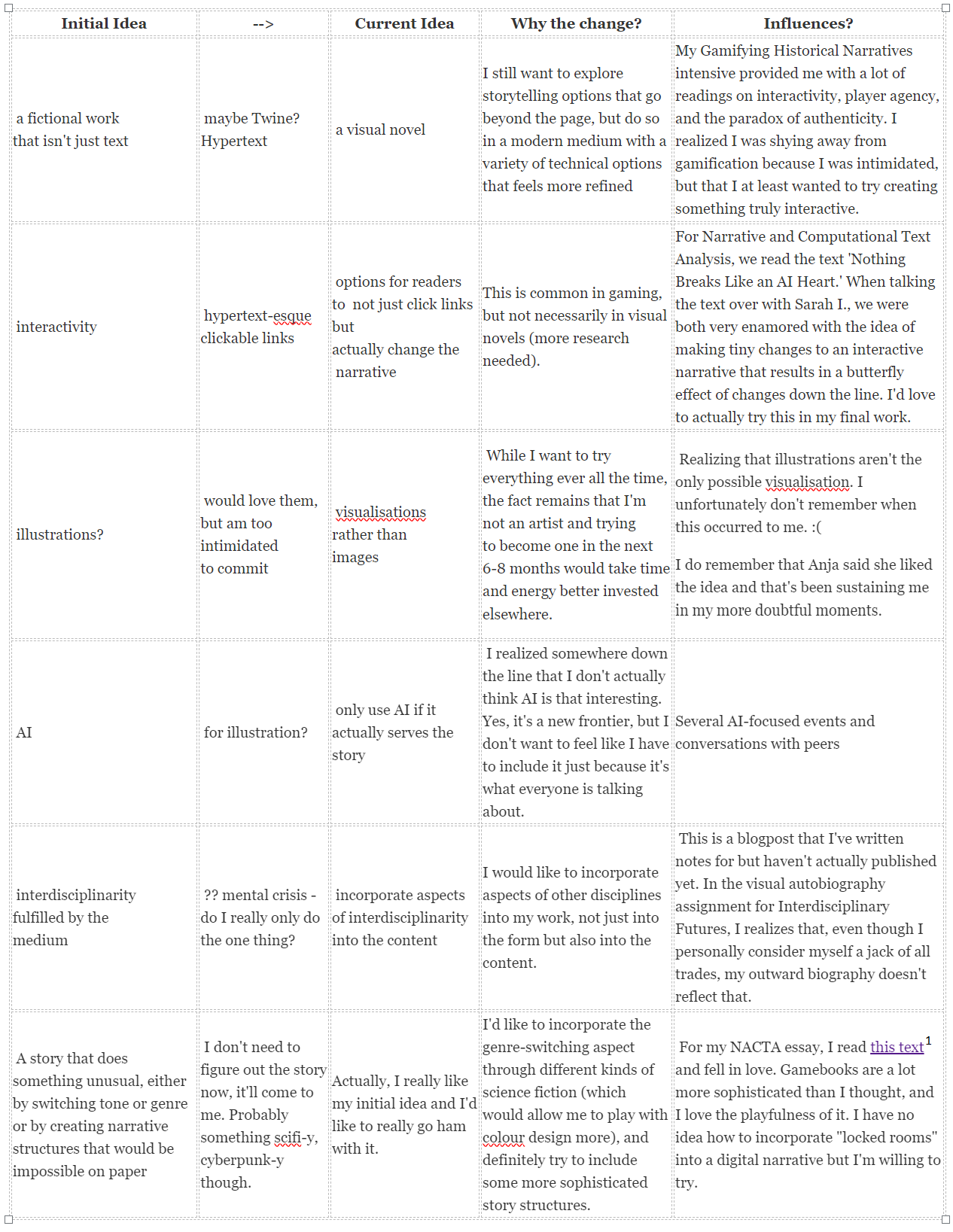I’m not actually much of a gamer. I’ve been playing Harry Potter: Hogwarts Mystery pretty steadily for the last five years and am up to level 3549 on Candy Crush, but my last time playing an actual video game was several years ago. I took Gamifying Historical Narratives out of sheer interest – because I know plenty of gamers who would have loved a course like this, and it seemed like an unusual approach to storytelling that I don’t have much experience with.
Category: weekly posts
Narrative and Computational Text Analysis was one of the intensives I was most excited for, and it certainly taught me a lot. I could probably write entire blogposts on every section of the course, but I’ll stick to things I consider to be relevant to my final project:
In week 4, as yet another week passed by without an intensive and some of my peers were saying they’d already had all of theirs, we began groupwork in Interdisciplinary Futures. My group was a good mix of disciplines – myself with Creative Writing and, after considering my Intellectual Autobiography for a while, Sustainability; and the others with International Relations, Education, and History.
I like working on my own. That’s due to a couple of reasons:
1) I haven’t necessarily had great experiences with groupwork. The collaborative assignments during undergrad and my PG certificate as well as in my professional life were usually very much me and one or maybe two other group members doing a lot of the groundwork, with the rest occasionally coming in with a little bit of help. In the past, doing groupwork has very much felt like doing all the work with other people occasionally throwing a wrench into your plans.
2) I’m both ambitious and a perfectionist and my definition of when a thing is done often doesn’t align with other people’s ‘good enough is good enough’ approach. Which is fair and a valid way to go through life, but I don’t just want ‘okay’. I want to do work that I’m proud of, not just scrape by.
3) My brain doesn’t go from point A to point B, it goes through a spaghetti tangle of threads that seem incomprehensible to anyone but me until it winds up on the plate as a coherent dish. Collaborating with other people when I’ve not at least gotten to a full draft stage is usually confusing for everyone involved.
However, because learning is a thing we do here, the groupwork assignment for I.F. actually turned out to be a pleasant surprise. While yes, there was the obligatory group member who promised they’d do their section ‘by next time’ three times in a row and that felt painfully familiar, the other three of us managed to meet, engage, and work together really well. There’s this claim floating around that groupwork is supposed to create higher quality work than a single person could manage on their own, and while that’s always seemed far out of reach for me, it actually happened here. Collaborating, advocating for our own perspectives while still respecting others’, and building on each other’s ideas was more productive, more rewarding, and more enjoyable than the work would have been on my own.
This realisation won’t help me much in terms of my final project, but it did give me a little bit of a thrill. And it’ll be a good takeaway for life after graduation – if only to allow me to reminisce about the good old days whenever future group collaborations fall short of what I’ve now come to expect.
Oh look, someone opened a wormhole and transported me straight from week 7 to week 10. 😅 (No, I’m kidding, someone opened a wormhole and dumped a whole lot of work on me, and that’s why I’ve not been keeping up with my blog.) But I have Thoughts about Things and will be updating those in the days&weeks to come.
Also, I spent 45 minutes trying to get this table to show up properly and failed, so here’s a screenshot.

- 1. this text
Two weeks ago, I came across the term visual novel and pounced on it. While the story I plan to write for my dissertation certainly won’t be novel-length, the concept of visual novels encompasses the middle-ground between text and game that I would like to explore. They’re close enough in interactivity to Twine that I would be able to include the ideas inspired by that medium, and still fairly new and niche (so rewarding to explore) but well-established enough that I can build off of existing structures without having to handicap myself with development.
Still, they’re a medium that I’m not incredibly familiar with and bring up several topics that I need to delve into in preparation for my dissertation. These can, broadly speaking, be split into 3 separate categories:
- The Content
- The Execution
- The Conversion
Which sounds like a great outline for a cyberpunk story, if you ask me.
While there are many topics of interest that I’d like to explore at some point and that would lend themselves well to a dissertation, some of the questions I entered into the Narrative Futures programme with and that I keep coming back to are: How can writing grow beyond its own boundaries of what is commonly done today? What if a novel weren’t only a novel? What is the future of the publishing industry? What storytelling forms are possible in publishing beyond merely words on a page?
The Intellectual Autobiography assigned for the Interdisciplinary Futures lecture last week had me – unexpectedly – struggling. It’s a deceptively simple assignment: convey your intellectual journey, be that academic or professional or personal, and note down which disciplines influenced your thinking and decision-making over time.
Ironically, when I looked at my finished draft, it didn’t at all reflect my own impression of my journey up to this point.

One of my (many) reasons for applying to the Narrative Futures programme was my ever-growing frustration with the stagnation of the publishing industry. While all around us, art explores new avenues, new mediums, new technologies, constantly creeping from the too-narrow or too-vague definitions that we try to contain it with, writing is just… writing. It’s words on a page, solely dependent on the writer’s ability to transform their ideas into words, and the reader’s ability to re-transform said words into ideas of their own.
I love books. I do. A good third of my possessions, currently in storage in another country, is books. I don’t want to abolish books, or claim that nobody even reads anymore, or decry the concept as outdated and stuffy. But I do think the traditionalist approach that writing consists of words on paper is stifling us as a community, and continually widening the gap of what we do and what we could be doing, if we only dared.

